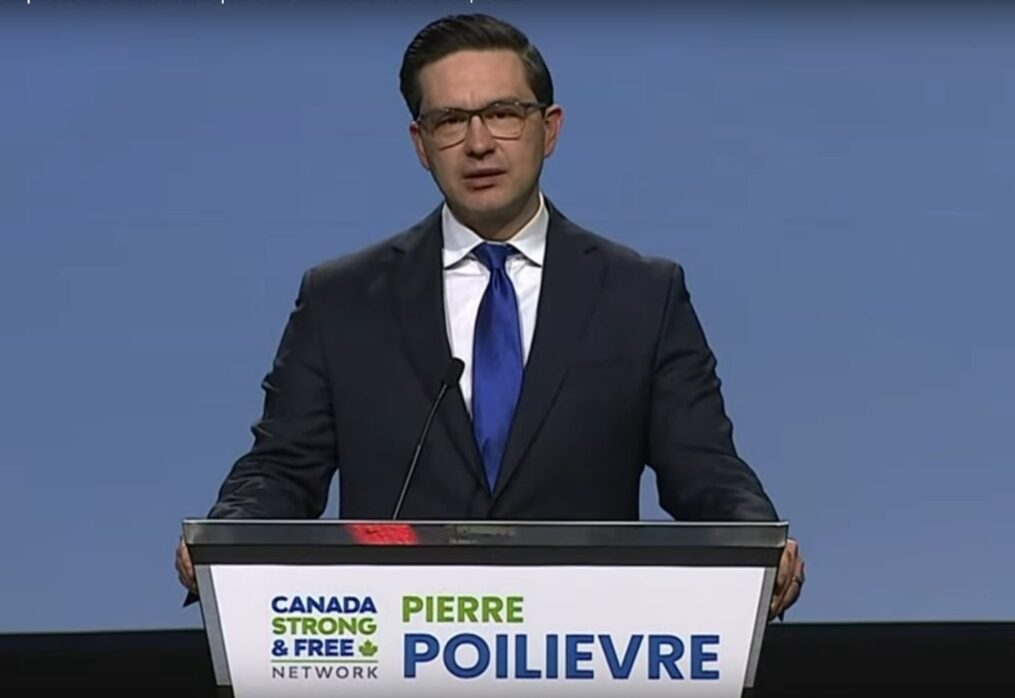CPC leadership candidates ignoring key issues affecting Canadians
The first debate amongst the CPC leadership candidates saw personal attacks and conspiracy theories, but no substantive talk on issues affecting the daily lives of Canadians.

The first unofficial debate of the Conservative Party of Canada (CPC) leadership race made no mention of climate change, Indigenous issues, homelessness, or Canada’s poisoned drug supply.
Instead, the most common theme of the night focused on the “truckers protest,” a nod to the occupation of the country’s capital that’s reported to have cost Ottawa taxpayers upwards of $36.6 million.
By the end of the night, Conservative voters were no closer to learning about the differences in candidate platforms. Instead, they were subjected to substance-level buzzword warnings of the most dire threats to Canadian democracy. Not the climate crisis or poverty but “wokeism,” “cancel culture” and the “radical left.”
Among the candidates vying for the party leadership are Members of Parliament Scott Aitchison, Leslyn Lewis, and Pierre Poilievre; former Quebec Premier Jean Charest and independent Ontario MPP Roman Baber. One contender, former MP and Ontario PC leader, Patrick Brown—who recently settled a lawsuit against CTV News—declined to participate in the unofficial debate.
The 90-minute debate in Ottawa was moderated by the Canada Strong & Free Network, as well as the right-wing outlet True North Media, a publication founded by a former Jason Kenney spokesperson that Press Progress reported in 2019 identified as a “media company,” an “advocacy organization,” and a “registered charity with the government of Canada.”
Notably, for a party that touts western alienation and has strongholds in provinces like Alberta, the roster of Conservative leadership candidates are entirely made up of Ontario or Quebec politicians.
The leadership candidates, in focusing so much of their time on vaccine mandates and the Trudeau government’s response to the pandemic, pandered to a limited base: only 15 per cent of Canadians have yet to get their first dose of a COVID-19 vaccine.
Even worse for Conservatives looking for a new leader was the bitter—and often dishonest—slandering of opponents. Poilievre in particular has reduced himself to throwing spaghetti at the wall to see what will stick in what’s increasingly appearing as a desperate, low-hanging fruit bid to cast Charest as a hardcore Liberal.
One issue most candidates all seemed to agree on, with the exception of Aitchison: Defunding the CBC and ending advertisement agreements with Canadian media.
The same individuals who are advocating the elimination of more than 7,000 jobs in the journalism industry, and are intent on “burning down,” Canada’s public broadcaster, as Aitchison put it, are also echoing conspiracy theories and deliberately misleading Canadian voters on key issues like the pandemic.
For an idea of how Conservatives are willing to weaponize the press, just look at the post-debate press conference, where right-wing propaganda machine Rebel News was given the first question
Poilievre, giving a Great Value edition of a Trump Republican nomination performance, received the loudest cheers from the overwhelmingly white audience.
While former Quebec premier Charest appeared early as the most level-headed, or perhaps restrained, of the group, Poilievre represented the Conservative’s most extreme candidate, invoking vaccine mandates and referring to the Liberals as a “big, bossy government.”
Poilievre touted his campaign strategy as not going through the media but “around them” to get his message out in forums like social media.
Charest managed to hold up despite repeated attacks from Poilievre, centring his campaign’s theme on “the idea of Canada” and to “preserve the unity of this country.” Their feud goes back to Charest’s comments where he suggested Poilievre should be disqualified from the leadership race for his participation in the Ottawa occupation.
Baber, a former Ontario PC Member of Provincial Parliament before becoming a liability and being subsequently tossed by party leader Doug Ford, delivered the weakest performance of the debate.
Other than his heated exchange with co-moderator Jamil Jivani, where Baber was told to “chill, bro,” most concerning was his opening statement admission that “I don’t even like politics.” How can someone who doesn’t like politics expect to steer an opposition party to victory?
Lewis, a hardline social conservative who is staunchly anti-abortion, immediately took the bait in the form of a jab from Aitchison in what represented a telling rebuttal against labeling Conservatives “conspiracy theorists.” Lewis, who has tweeted conspiracy theories herself in the past under the guise of “concern,” may have thought that was a personal jab.
The CPC has struggled to gain momentum following Stephen Harper’s loss in 2015. Neither of the past two former leaders in Andrew Scheer nor Erin O’Toole managed to build a path to the Prime Ministers’ Office.
The first of two official party debates is scheduled for May 11, while the second is set to take place on May 25.
A new leader is set to be announced by the party on Sept. 10 and will succeed interim party leader Candice Bergen.
DONATE & SUPPORT
Thank you for reading this story…
More people are reading rabble.ca than ever and unlike many news organizations, we have never put up a paywall – at rabble we’ve always believed in making our reporting and analysis free to all, while striving to make it sustainable as well. Media isn’t free to produce. rabble’s total budget is likely less than what big corporate media spend on photocopying (we kid you not!) and we do not have any major foundation, sponsor or angel investor. Our main supporters are people and organizations — like you. This is why we need your help. You are what keep us sustainable.
Stephen Wentzell is rabble.ca‘s national politics reporter, a cat-dad to Benson, and a Real Housewives fanatic. Based in Halifax, he writes solutions-based, people-centred…
More by Stephen Wentzell
